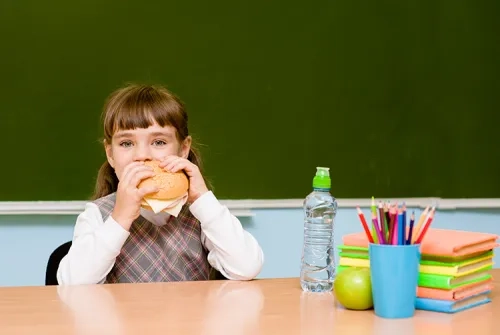Alo Yeditepe
Alo Yeditepe
Children's Eating While Studying Prepares the Ground for Obesity
Are you one of those parents who fill the study table with food so that your child can snack on fruit, cake, and pies while studying? This behavior, which is done for the nutrition of children, causes the child to make a connection between studying and eating. The child, who learns the behavior of eating while studying, continues this behavior afterward. During his/her long education life, he/she continues to eat while studying. Specialist Clinical Psychologist and Specialist Dietitian Merve Öz said that this approach also increases the risk of obesity in children.
It Triggers Emotional Eating
Saying that the habit of eating while studying triggers emotional eating in the long term, Specialist Clinical Psychologist and Specialist Dietitian Merve Öz from Yeditepe University Koşuyolu Hospital, stated, “Emotional eating is a person's response to events by eating rather than hunger. The person eats because he/she is sad or stressed, that is, to create positive emotion. Children also eat not because they are hungry, but simply to make studying enjoyable. Most of the time, he/she cannot focus on the food in front of him because he/she is focused on the lesson and does not know what and how much he/she eats. When he/she reaches out to get it again, he/she realizes that the fruit plate or bowl of nuts is finished. Or he/she cannot study effectively because he/she focuses on food. The food in front of him/her reduces the child's studying efficiency.”
Excess Weight Becomes Inevitable
Merve Öz, who drew attention to the fact that the risk of obesity increases as a result of the inactivity of sedentary studying and the excess calories from the snacks eaten while studying, said, “In addition, due to emotional hunger, the child suppresses the stress created by a problem that he/she cannot solve by eating a piece of fruit or a few walnuts. By learning to eat emotionally in this way, he/she adds this habit to other areas that create stress other than studying. Since the metabolism of children is overactive, even if they do not face obesity in this period, the metabolism slowing down with the increase of age can cause obesity to emerge at other points in life.”
Eating Behavior Begins in Childhood
Reminding that eating behaviors start at a young age, Nutrition, and Diet Specialist Merve Öz said, “Behaviors learned in childhood are continued in adulthood. For this reason, behaviors such as eating vegetables, eating only at the kitchen table, and having breakfast should be taught at a young age. Behaviors that are desired to be taught to children should be practiced primarily by parents. If a parent who does not eat vegetables advises their child to eat vegetables, it will not be very beneficial for the children to adopt the behavior. Because children learn by observing behavior.”
To Get Rid of the Habit…
Specialist Clinical Psychologist and Specialist Dietitian Merve Öz from Yeditepe University Hospital gave the following information about the right approach for a child who has the habit of eating while studying: “If your child cannot study without food on his/her desk while studying, you can give foods with high water content such as cucumber, lettuce and carrot until he/she gives up this behavior. You can ask your child to take a break after studying for 40-45 minutes. And you can let him/her eat whatever he/she wants when he/she takes a break. The habit of drinking water is very difficult to form. Your child should have a water bottle on his/her desk so that he/she can get into the habit of drinking water.”
Press Coverage: haberler.com | cnnturk.com | star.com | yeniakit.com | beyazgazete
About
Faculty and Year of Graduation:
Yeditepe University Faculty of Arts and Sciences, Department of Psychology and Faculty of Health Sciences, Department of Nutrition and Dietetics, 2016
”
See Also
- What is Vitamin A? What are the benefits of Vitamin A?
- What is Selenium? What Does It Do? What are the Benefits?
- Does the Sweltering Heat Affect Our Mental Health?
- What is Vitamin E?
- What is Coenzyme Q₁₀? What are the Benefits of Coenzyme Q₁₀?
- What is Vitamin B12? What are the Symptoms of B12 Deficiency?
- What is Mythomania (Pathological Lying Disorder)? What Causes Mythomania?
- What is Emotional Hunger? How Does It Arise?
- Benefits of Spices
- What Does Narcissist Mean? Narcissistic Personality Disorder
- At What Age Should Children Start Using Social Media?
- What is the Ideal Age for Marriage?
- Special Nutrition Recommendations for the Eid
- The True Face of the Protein Myth
- What Are the Benefits of Beets?
- Suggestions to Get Rid of the Menopause Belly
- "Is the Watermelon Diet Healthy?
- Ways to Boost Mental Resilience
- Frequently Asked Questions about Detox
- Boost Your Immunity Naturally
- Which Foods Should be Consumed Together?
- How Do You Approach a Child Who Is Reluctant to Go to School?
- Stop Blaming Yourself
- The Concern of Being a ‘’Good Mother’’ in Pregnancy
- It is Possible to Lose Weight by Dominating Your Brain
- Mom, Can I Sleep With You?
- 9 Points to Be Considered for a Healthy Ramadan Month!
- Emotional Eating May Be the Cause of Your Weight Gain
- The Healthiest Summer Fruits
- Shining Star of the Tables: Probiotics
- The Problem may be the Lack of Self-Confidence!
- Ways to Deal with Quarantine Weight
- Burnout Syndrome at Work Gains Weight
- Children Should Be Away From Fast Food Toy
- Permeable Bowel Syndrome Can Prepare the Ground for Diseases
- Suggestions to Prevent Children from Gaining Weight While Still
- 8 Suggestions to Keep the Immune System Strong in Ramadan
- 8 Suggestions for Kids with Focus Problems
- It is also Possible to Lose Weight During the Holidays!
- Immune Enhancing Nutrients
- Is Co-Sleeping With the Child Right?
- Healthy New Year's Eve Table Suggestions
- Do not take unneeded calories to your body
- Suggestions to Increase Metabolic Rate…
- Nutrition Recommendations Before the Exam
- How to Feed Children in Summer?
- Is There a Nutritional Difference Between Sports to Increase BMI and Sports to Lose Weight?
- What Should You Do to Avoid Gaining Weight for the Holidays? Do Not Be a Victim of the Buffet
- Cancer and Nutrition
- Nutrition and Diet
- Healthy Diet
- Elderly Care
- Alkaline Nutrition
- 9 Tips to Prevent You from Gaining Weight While at Home
- 9 Suggestions to Fix Childrens Deteriorated Eating Habits
- Fibromyalgia May Be the Cause of Persistent Pain
- What to do from Iftar to Sahur for a Healthy Ramadan
Alo Yeditepe




